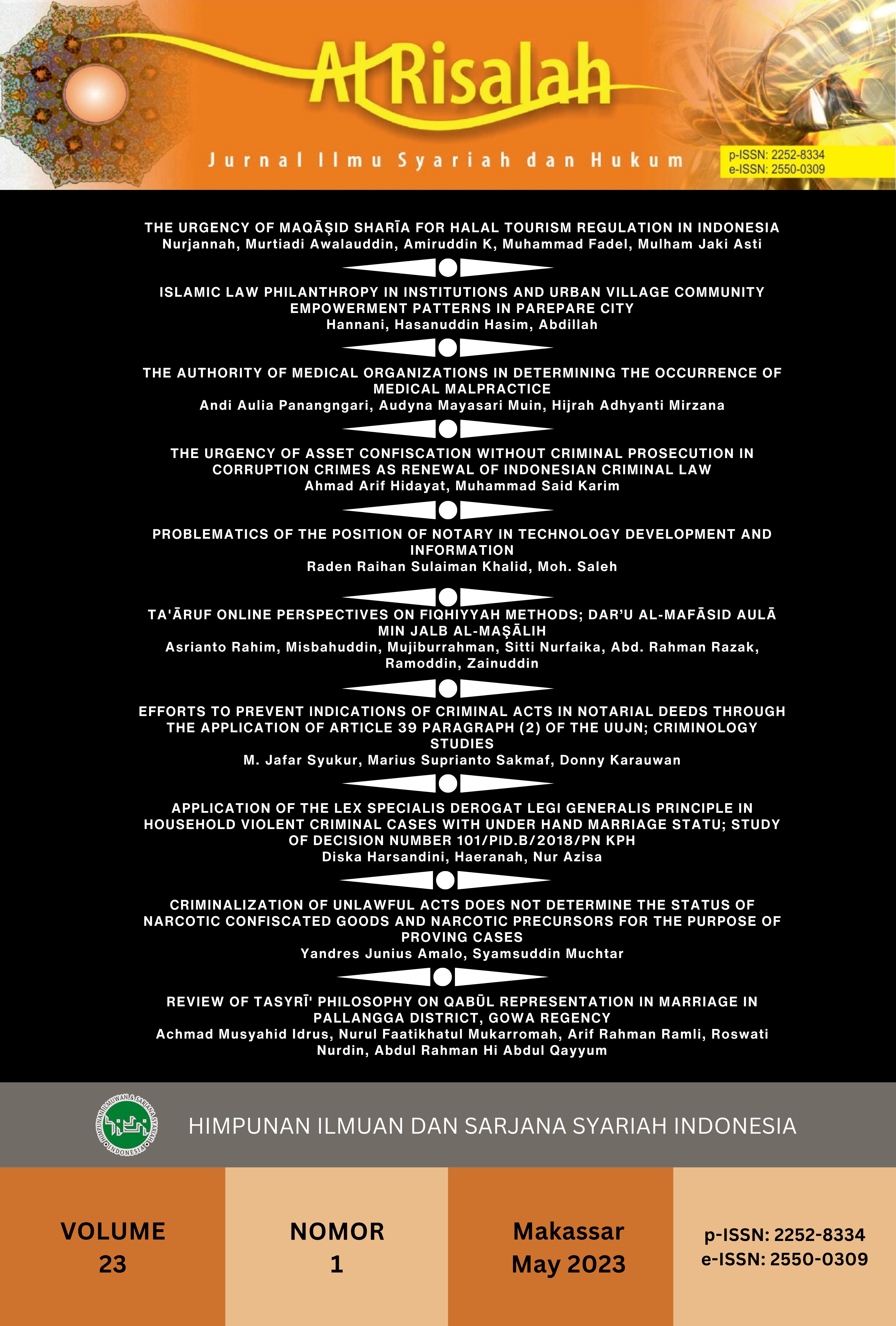THE AUTHORITY OF MEDICAL ORGANIZATIONS IN DETERMINING THE OCCURRENCE OF MEDICAL MALPRACTICE
Abstract
This study aimed to examine and analyze the authority of medical organizations in determining the occurrence of medical malpractice and to examine and analyze the judge's consideration of Decision Number 1441/Pid/Sus/2019/PN Mks. This study used a normative juridical research method with a statute approach and a case approach. The data analysis employed descriptive qualitative analysis, which was correlated with concepts and theories from various literary sources. The results of the study revealed that the Indonesian Medical Association (IMA), through Honorary Council for Medical Ethics (HCME), was authorized to determine the occurrence of medical malpractice. This authority was manifested through the revocation of the license of the doctor who became the defendant, even though the judge's decision stated that no malpractice was found by the defendant. Regarding Decision Number 1441/Pid.Sus/2019/PN. Mks, the acquittal for Mrs. Dr. Elizabeth Susana M. Boing was right. Many opinions confirmed that the incident was a result of medical risks rather than medical malpractice committed by Mrs. Dr. Elizabeth. However, it was considered a work accident that resulted in a medical risk, which basically did not result in criminal sanctions.
References
Basuki, Udiyo. “Merunut Konstitusionalisme Hak Atas Pelayanan Kesehatan Sebagai Hak Asasi Manusia.” Jurnal Hukum Caraka Justitia 1, no. 1 (2020): 21–41. https://doi.org/http://dx.doi.org/10.30588/jhcj.v1i1.699.
Darojad, Zaqiah. “Penggunaan Diskresi Oleh Pejabat Pemerintahan Dalam Kaitannya Dengan Kerugian Keuangan Negara Yang Mengakibatkan Tindak Pidana Korupsi.” Jurnal MP (Manajemen Pemerintahan) 5, no. 2 (2018): 125–40. https://ejournal.ipdn.ac.id/JMP/article/view/435.
HR, Ridwan. Hukum Administrasi Daerah. Jakarta: Raja Grafindo Persada, n.d.
Lestari, Tri Rini Puji. “Pendidikan Keperawatan: Upaya Menghasilkan Tenaga Perawat Berkualitas.” Aspirasi: Jurnal Masalah-Masalah Sosial 5, no. 1 (2014): 1–10. https://doi.org/https://doi.org/10.46807/aspirasi.v5i1.452.
NomensenSinamo. Hukum Administrasi Negara Suatu Kajian Kritis Tentang Birokrasi Negara. Bekasi: Jala Permata Aksara Jakarta, 2016.
Perhumpunan Dokter Anti Penuaan, Welness, Estetik, Regeneratif Indonesia. “Perwaderi.” Situs Resmi Perwaderi, 2023.
Setiawan, I Kadek. “Inkonsistensi Pengaturan Dalam Pelaksanaan Kewenangan Dan Biaya Pemberian Izin Usaha Mikro.” Jurnal Legislasi Indonesia 14, no. 03 (2017): 337–44. https://doi.org/https://doi.org/10.54629/jli.v14i3.134.
Shadiqin, Moch Thariq, Muhamad Azhar, F C Susila Adiyanta, and Siti Rohani. “Vaksinasi Covid-19: Hak Individu Atau Kewajiban Publik Dalam Civil Society?” Masalah-Masalah Hukum 51, no. 02 (2022): 106–16. https://doi.org/https://doi.org/10.14710/mmh.51.2.2022.106-116.
Sihotang, Erikson. Prinsip Hukum Dalam Tata Kelola Rumah Sakit. Menara Madinah, 2014.
Simanjuntak, Bungaran Antonius. Konsepku Mensukseskan Otonomi Daerah : Membangun Indonesia Berkeadilan Sosial-Ekonomi. Jakarta: Yayasan Pustaka Obor Indonesia, 2017.
Soeprto, Pitono. Etik Dan Hukum Di Bidang Kesehatan. Surabaya: Airlangga University Press, 2006.
Walima, Ely. Manajement Pengembangan Sumber Daya Manusia Kesehatan. Pekalongan: Penerbit NEM, 2021.
Copyright (c) 2023 Andi Aulia Panangngari, Audyna Mayasari Muin, Hijrah Adhyanti Mirzana

This work is licensed under a Creative Commons Attribution 4.0 International License.


